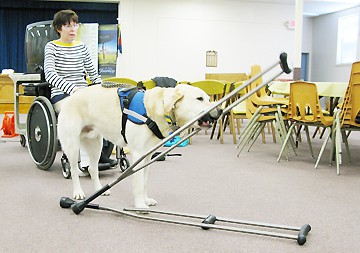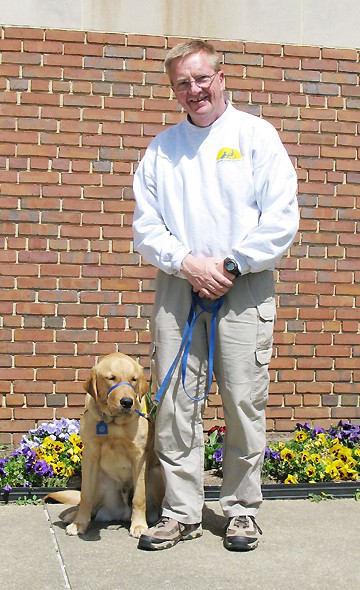Good Dogs
Since birth, Eaton’s destiny has been to serve. The golden retriever-Labrador mix was bred to be a calm, focused and obedient companion to a human in need. Aspiring to join the 1,721 active Canine Companions for Independence teams, Eaton hopes to help a disabled owner live a fuller life.
For duty’s sake, Eaton gave up a typical puppy-hood.
“We got him at eight weeks,” says Anne Arundel County Deputy Chief of Police Emerson Davis, who, with wife Donna, signed on to raise Companion puppies.
After the extensive application process, the Davis family supports Eaton — from food to vet bills — while they raise him for another person. It’s hard to fall in love with a puppy and then let him go, Davis acknowledges, but the end justifies the heartbreak.
“I had a brother with Down Syndrome, so I know what it’s like for people with disabilities,” says Davis. “I’m on the Commission of Disabilities, too, so I know what these dogs can do.”
Eaton is the couple’s first puppy-raising assignment.
“It’s a lot more fun than training a regular pet,” Davis says, of a curriculum that includes basic obedience; exposure to as many smells, sights and sounds as possible; acclimation to a menagerie of animals; and behavior at human workplaces.
| Eaton, a golden retriever-Labrador mix, has been in training to become a Canine Companion for Independence since he was eight weeks old. |
Eaton splits his week between the Anne Arundel County Police offices with Emerson and the St. Anne’s School with Donna, who had to teach self-control to both her dog and her young students. Eaton is so restrained that he has yet to bark, because the Davises haven’t taught him a barking command.
“In the beginning, I would spend 15 to 20 minutes on specific commands. He is always training on something, whether it’s a meeting or at the grocery store,” Davis says.
Even lying quietly on the floor while humans speak over his head, Eaton is in training.
Canine Companions for Independence oversees with training guidelines. Eaton is scheduled to learn certain skills by certain ages. Each month, the Davises file a report with Companions describing Eaton’s progress, medical condition and attentiveness.
When Eaton graduates to advanced training, the Davises will keep up with him through a monthly progress report from Companion’s training facility.
“We have him until he’s 18 months old,” Emerson says. “Then we send him off to Puppy College.”
Dedicated to the Job
For all the cute nicknames, Companions’ Regional Training Center in Medford, New York, is an intensive program that prepares each dog for one of four jobs: Service Dogs assist the physically disabled with everyday tasks; Hearing Dogs alert deaf and hearing-impaired people to important noises; Facility Dogs work as visitation, healthcare and education ambassadors; Skilled Companions help children and adults with cognitive and developmental problems achieve greater independence.
Canine Companions for Independence doesn’t train seeing-eye dogs for one important reason: Seeing-eye dogs must learn how to disobey commands when appropriate.
“It’s a totally different set of skills,” explains Davis. “If a blind person walks down to the edge of City Dock and tries to go forward, his dog will balk. That’s how [seeing-impaired people] know it’s dangerous and not to continue.”
 |
Companion dogs are trained to obey, always. Their services are essential to their people’s daily lives, so refusing a task isn’t part of the job — or the training.
“You take one of our dogs down to City Dock and try to walk off, you’re going to get wet,” says Davis. “They’ll just say okay and jump in with you.”
The graduate Companion dog obeys commands 24/seven. Nancy Patterson — Companions’ Maryland Volunteer Coordinator and Davis’ presentation partner — was matched with her service dog Mahler, another golden/Lab mix, in November, 2007. Five years into the partnership, Mahler opens her doors, fetches her crutches, pulls her wheelchair, brings in groceries, recycles and picks up change Patterson dropped.
“There are Companion dogs, and there are real dogs,” Patterson explains. “What Mahler does aren’t tricks; they’re essential to me. Mahler is on call all the time.”
One of the frustrations of owning such a cuddly helpmate is that strangers don’t understand their importance. By petting a Companion dog without permission, you can distract the dog from its job.
“It’s not that I’m mean or the dog is mean, but he’s just a dog and I need him to focus,” Patterson says.
On to Something Great
Focus is a lot to ask from a puppy, and many of the nearly 800 Companion pups don’t make it through training.
 |
“Last year, 262 teams graduated,” Davis reports. “About 45 percent of the puppies graduate to become full Companion dogs. Dogs are disqualified for various reasons. Even if they can do the work, if they don’t like doing it, they’re rejected.”
Because of these rigorous demands, Companion dogs have formed a sort of fraternity.
“Eaton loves meeting other Canine Companions for Independence dogs,” says Davis. “When he sees the vest [worn by a Companion working dog], he gets really excited.”
Patterson sees the same pattern. “I’ll have Mahler walk along City Dock, and he’ll ignore 100 dogs. But he’ll get excited for a Companion dog,” she says.
Dogs are rejected from the program if medical testing even hints at a problem in the future. If a dog is rejected, his puppy raisers may adopt him. Emerson has assured Eaton he’ll always be welcome in the Davis home.
When Eaton gets the call to college, how will Davis let go of his puppy?
“My wife likes to say it’s the difference between wants and needs,” Emerson says. “I want Eaton. I want to keep him so bad I can taste it. But I know that someone else needs him. At least when I give Eaton up, I know he’s going on to do something great.”
To support Canine Companions for Independence and see Mahler and Eaton in person, buy tickets to April 22’s Sails and Tails event at Pusser’s Caribbean Grill: www.cci.org. See 8 Days a Week for details.
